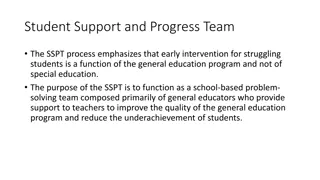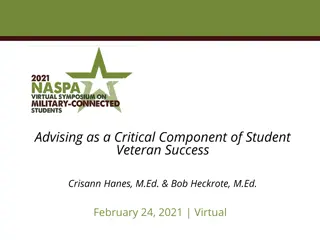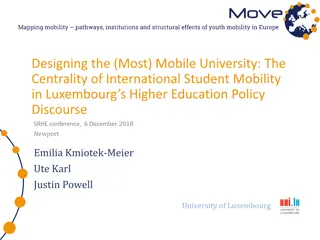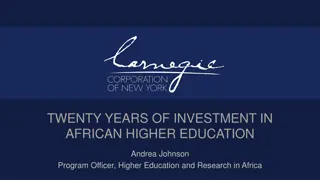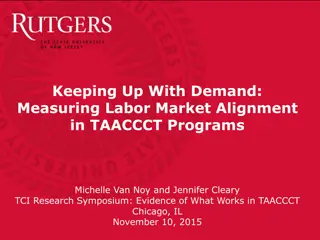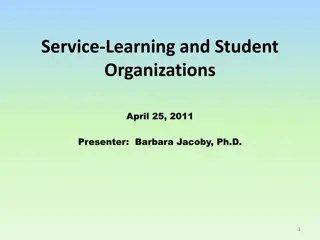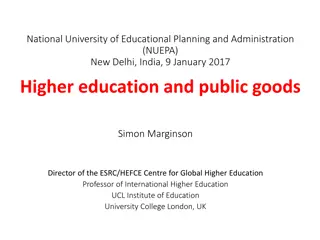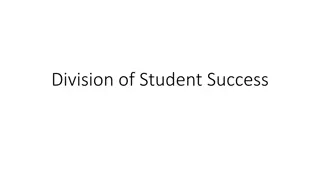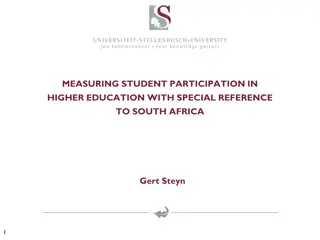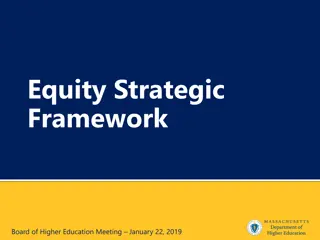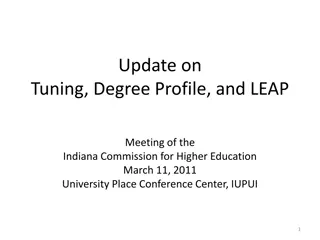Enhancing Student Success in Higher Education: A Research Perspective
Explore factors influencing study progress and success among university students. Understand the varying study paces in Finland and the key elements like motivation, self-regulation, and cognitive strategies that impact student outcomes. Gain insights from a 7-year study on differently progressing students and differentiate procrastination from strategic delay for effective student support.
Download Presentation

Please find below an Image/Link to download the presentation.
The content on the website is provided AS IS for your information and personal use only. It may not be sold, licensed, or shared on other websites without obtaining consent from the author.If you encounter any issues during the download, it is possible that the publisher has removed the file from their server.
You are allowed to download the files provided on this website for personal or commercial use, subject to the condition that they are used lawfully. All files are the property of their respective owners.
The content on the website is provided AS IS for your information and personal use only. It may not be sold, licensed, or shared on other websites without obtaining consent from the author.
E N D
Presentation Transcript
PREDICTING SUCCESS AND SUPPORTING STUDENTS IN HIGHER EDUCATION SARI LINDBLOM VICE-RECTOR, PROFESSOR OF HIGHER EDUCATION UNIVERSITY OF HELSINKI, FINLAND
AIMSOF MY PRESENTATION To explore individual study paths of university students in particular, factors that enhance and impede study progress and success To look at different ways to support student learning
IN FINLANDSTUDYPACE VARIESGREATLY Students are expected to proceed according to the 3+2 schedule , but there are no severe consequences if they do not do so However, they can loose their monthly government- financed study grants Students can still continue to the next year even with unfinished courses This national characteristics (read: problem) creates an interesting research topic because of the variation Some study much faster and some much slower than the expected study pace
MANY FACTORS ARE RELATED TO STUDY PROGRESS AND SUCCESS motivation and interest in studying metacognitive and self-regulation skills self-efficacy for self-regulation strong self-efficacy beliefs volitional mind-set deep approach to learning cognitive-attributional strategies optimistic task-focused strategy defensive-pessimism strategy
RESULTS FROM A 7-YEAR FOLLOW-UP STUDY OF SLOWLY AND FAST PROGRESSING STUDENTS in collaboration with Telle Hailikari and Liisa Postareff and also with Anne Haarala-Muhonen, Emmi Saariaho and Mikko Inkinen
DIFFERENTIATING PROCRASTINATION FROM STRATEGIC DELAY(KLINGSIECK , 2013) In procrastination delaying an act is unnecessary, irrational and even harmful. Procrastination involves negative consequences and can be accompanied by subjective discomfort or other negative consequences. In strategic delay, a student is confident that the positive consequences will eventually outweigh the potential negative ones. There is no functional form of procrastination, but there is a functional form of delay, i.e. strategic delay
COMPARISON OF LAW AND HUMANITIES STUDENTS Sixty-six Bachelor-level humanities and law students Shortest study times in law and slowest in humanities The slow study-pace students (n=28) lacked at least a quarter of the required 60 ECTS The fast study-pace students (n=38) had gained more than the required 60 ECTS Deep interviews after the first study year Two different questionnaires during Bachelor years Follow-up of the study success and study pace until Master graduation
PROGRESS PROFILES (N=66) SLOWLY PROGRESSING STUDENTS (n=28) FAST PROGRESSING STUDENTS (n=38) 1 Unnecessarily delaying students (n=8) Strategic delayers (n=10) Delay due to external factors (n=1) Effortlessly progressing students (n=26) Strenuously progressing students (n=11) Procrastinators (n=10)
PROCRASTINATORS They lacked self-regulation and time-management skills and had weak self-efficacy beliefs They were not unmotivated, but had weaker motivation to study compared to students in the other profiles, and the least positive study experiences
AN EXAMPLE OF A PROCRASTINATING STUDENT Lazy. Aimless. Floating. So I m not the kind of person who has clear long-term objectives. I could be more active. In high school I liked that someone was watching and monitoring me. At university I should also have someone with authority to push me forward. You know, it s too easy here to think that I will do this the next year, so delaying is not that harmful. I know that some students succeed at being efficient and organized, but I m not the only one like this.
UNNECCESSARILY DELAYING STUDENTS They had good study plans but did not succeed in executing them A clear intention-action gap These students were motivated to study and were interested in their subjects, but showed weaker volition
AN EXAMPLE OF AN UNNECESSARILY DELAYING STUDENT I m very good at making plans, but quite poor at executing them. I try to allow myself free time as well, but studying seems to steal it. I try to use my time effectively, but because I work part-time, it s often difficult to really have enough time for everything.
STRATEGIC DELAYERS Motivated to study and interested in their subjects They showed strong self-efficacy beliefs Had intentionally studied slowly or had prioritised something other than studying
AN EXAMPLE OF A STRATEGIC DELAYER I think I have good time-management skills, because I have been able to do a lot of sports and work while studying. I think there is a nice balance now and I m quite happy about what I m able to do in one week. I try to plan my schedule about a month ahead.
STRENUOUSLY PROGRESSING STUDENTS Highly motivated and interested in their disciplines They had worked hard to meet deadlines and to maintain their fast study pace. Even though these students had not missed deadlines, they felt that time management was a challenge for them. They had experienced some level of stress or workload but their stress level was not overwhelming
AN EXAMPLE OF A STRENUOUSLY PROGRESSING STUDENT Toward the end of each term I always get a little stressed, because I realise that I have a million things to do. The thing is that you yourself have to take responsibility. There is no one to push you forward; it's up to you. It's kind of a time-management problem, but everything has gone surprisingly well. All assignment work seems to be concentrated in a short time period and that brings stress, but it's always very short term. This happens because I'm interesting in everything. I feel like I m in a candy store and it's very difficult to take just some, because I want so much.
EFFORTLESSLY PROGRESSING STUDENTS Highly motivated and interested in their disciplines They showed a volitional mind-set Interestingly, all except two had worked at least part time during the academic year without it affecting their studies. They had very good self-regulation and time- management skills, and had tailored their skills to fit their objectives and personal preferences study progress had been very easy and 'smooth' strong self-efficacy beliefs and strong self-efficacy for self-regulation, and their study experiences were the most positive of all students
AN EXAMPLE OF AN EFFORTLESSLY PROGRESSING STUDENT I expected studying at university to be tough and also that I might not always be enthusiastic about attending lectures, but neither have happened yet [laughs]. It's been really nice; this feels like my thing. I did not enjoy high school, and therefore did not expect such high motivation, but I guess this can happen when you find your own thing. What you learn here is totally up to what you do yourself. This kind of independence is really nice you are really responsible for your own studies and for becoming an expert in your own field.
THE NATURE AND STRUCTURE OF THE PROGRAMME PREDICTS GRADUATION TIMES Differences between law and humanities students Graduation times were faster in the profssional law programme than in the humanities programmes where there is more freedom of choice
THEFASTSTUDENTSARE STILLTHEFASTESTAFTER 5 YEARS All Effortlessly progressing students in Law had completed their Master s degrees Of these, 43% in less than 5 years All of the Humanities students had completed at least the Bachelor s degrees All the strenuously progressing students had completed at least their Bachelor s degree (in 3 years): Study pace was slower than in the Effortlessly progressing students group Differences start to emerge in Master s studies?
FAST STUDY PACE SEEMS TO PREDICT STUDY SUCCESS Effortlessly progressing students graduated fastest and succeeded the best GPA 4/5 Strenuously progressing students also succeeded above average GPA 3.5/5
SLOWSTUDENTS UNFORTUNATELYSTAY SLOW First-year success predicts graduation times Worrying results concerning the slowly progressing students The Procrastinators had the lowest proportion of graduates and the lowest study success Only 25 % of the humanities students had completed their Bachelor s degree. (One had also completed the Master s degree.) Disciplinary difference: all law students in this profile had completed their Bachelor s degrees
WHAT HAPPENED TO STRATEGIC DELAYERS IN HUMANITIES? Less than half of the Strategic delayers in humanities had completed their Bachelor s degrees None of the humanities students had a Master degree, but each had ample credits The law students had completed their Master s degrees, but the average graduation time was much longer than those of the two fast-progressing groups Too many options is harmful for strategic delayers? Broad interests and difficulty to make decisions concerning big choices ?
TAILORING SUPPORT IS IMPORTANT Procrastinators need the most support A vicious circle develops fast and is not easy to unravel Strategic delayers do surprisingly badly in humanities Counselling and support in making important decisions are important Strenuously progressing students experience an increasing amount of workload and stress In particular during their Master studies Their problems easily remain hidden
Thank you for you interest! sari.lindblom@helsinki.fi




